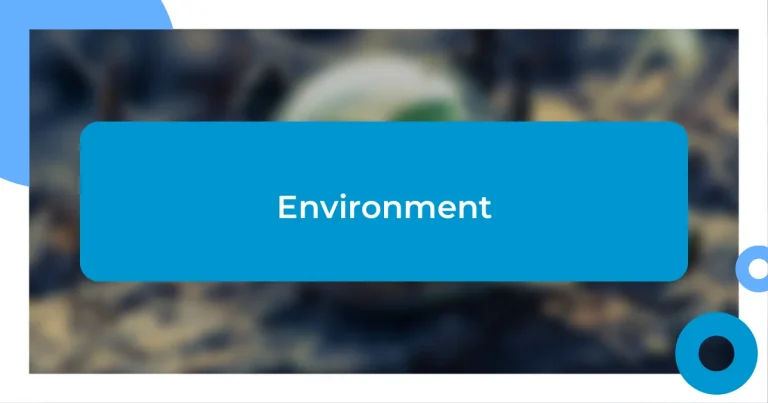Key takeaways:
- Ethical fundraising is rooted in integrity and transparency, fostering trust between organizations and donors, which is crucial for long-term support.
- Building strong relationships with donors through honest communication, regular updates, and appreciation of contributions leads to deeper engagement and advocacy.
- Inclusivity and responsiveness to donor feedback enhance the fundraising experience, ensuring that campaigns resonate with community needs and values.
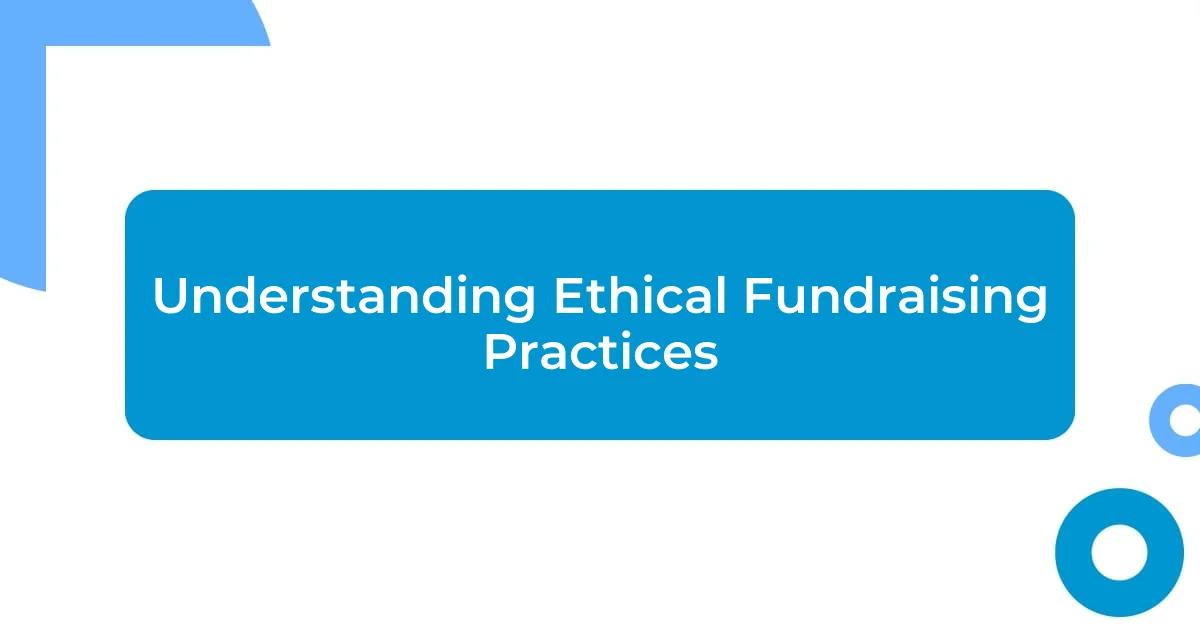
Understanding Ethical Fundraising Practices
I remember my first experience with fundraising—it was exhilarating yet nerve-wracking. You quickly realize that ethical fundraising isn’t just about raising money; it’s deeply rooted in integrity and transparency. Have you ever found yourself questioning the practices of a campaign? Such doubts can undermine trust, which is the bedrock of successful fundraising.
Ethical fundraising practices respect the dignity of donors and beneficiaries alike. I once witnessed a non-profit that prioritized relationships over profits, genuinely listening to the community’s needs. It was heartwarming to see how this approach fostered a deeper connection and resulted in continued support. Isn’t it fascinating how authentic engagement can transform the donation experience?
Understanding the nuances of ethical fundraising means recognizing the impact of our choices. For instance, when crafting a message for potential donors, I always consider: how would I feel if I were on the receiving end? That question guides me to create respectful and appealing communications, ensuring that people feel valued and informed rather than coerced. It’s a delicate balance but one that can define the success of any fundraising initiative.
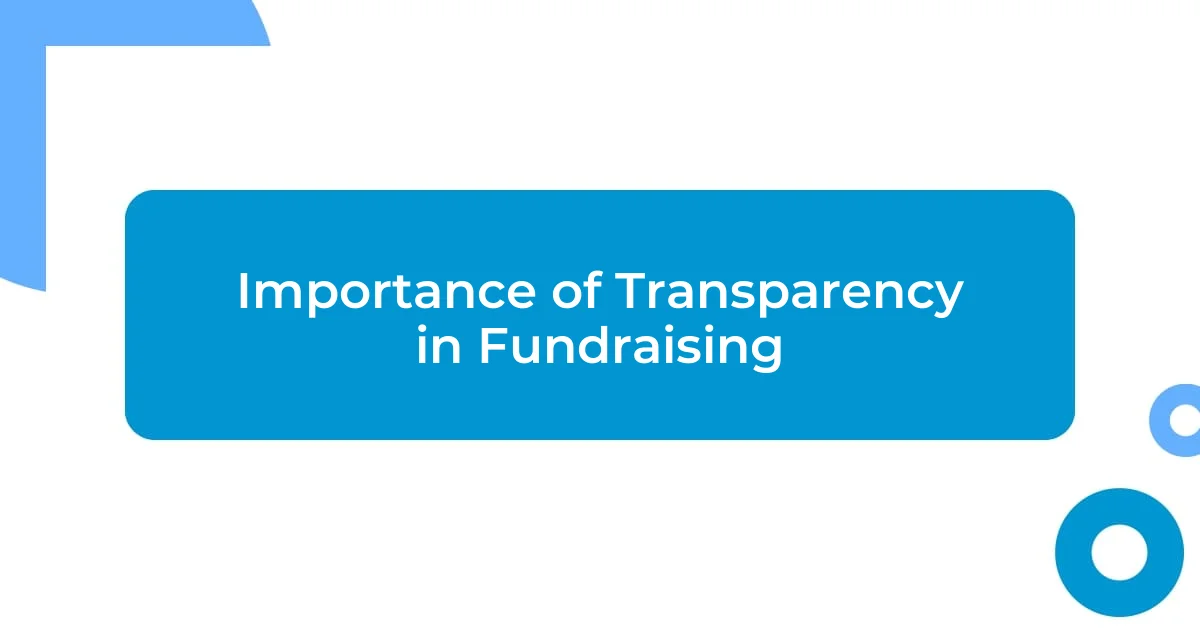
Importance of Transparency in Fundraising
Transparency in fundraising is essential as it builds trust between the organization and its supporters. I recall a particular fundraiser where the organization openly shared how every dollar raised would be allocated. This level of clarity not only increased donations but also made donors feel like crucial partners in the mission. Have you ever sensed that you were part of something bigger than yourself? That’s the magic of transparency—it engages and empowers supporters.
When a fundraising campaign lacks transparency, it can lead to skepticism and distrust. I’ve experienced this firsthand during a campaign where fund allocation was vague. Many potential donors expressed reluctance, feeling unsure about where their contributions would go. It was a stark reminder that clear communication about project goals and funding use can significantly impact donor willingness to contribute. Isn’t it striking how clarity can pave the way to generosity?
Furthermore, transparency encourages accountability in organizations. In one project, I saw a nonprofit publish regular updates on their fundraising goals and expenditures. This not only kept donors informed but also authenticated their ongoing commitment to the cause. It gave me confidence that my support was genuinely making a difference. This open dialogue fosters a long-term relationship with donors, making them feel valued and respected.
| Aspect | Transparent Fundraising |
|---|---|
| Trust Level | High – builds trust and confidence |
| Donor Engagement | Increased – supporters feel involved and informed |
| Skepticism | Low – clear communication reduces doubt |
| Accountability | Enhanced – regular updates promote responsibility |
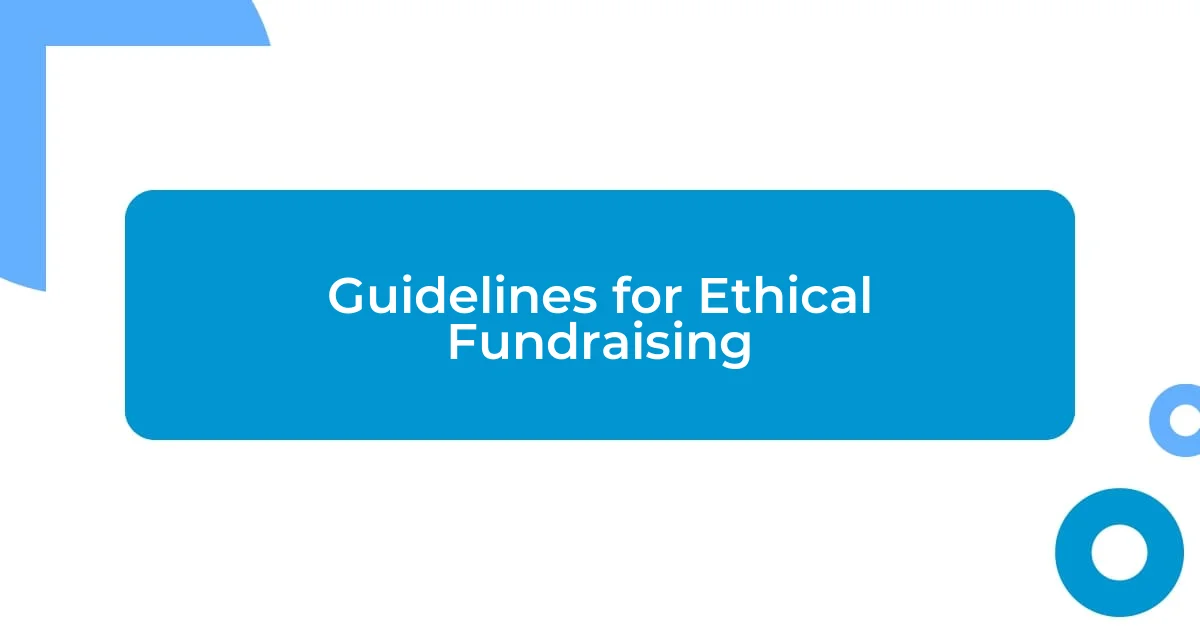
Guidelines for Ethical Fundraising
Guidelines for Ethical Fundraising
Establishing guidelines for ethical fundraising practices is essential to create a respectful and effective campaign. From my experience, developing a clear code of conduct early on helps ensure everyone involved understands the principles guiding the initiative. I find that when everyone is aligned with these ethical standards, it fosters a positive environment for both organizers and donors.
Here are some key guidelines to consider:
- Prioritize Honesty: Be upfront about your fundraising goals and how the funds will be used. Transparency goes a long way in building trust.
- Respect Donor Privacy: Always protect the personal information of your donors and use it responsibly. I’ve seen organizations lose donor trust over privacy breaches.
- Communicate Clearly: Use plain language when discussing your mission and needs, avoiding jargon that might alienate potential supporters.
- Be Accountable: Regularly update donors on the campaign’s progress and outcomes. Sharing successes and challenges cultivates a deeper connection.
- Engage Responsively: Foster an open dialogue with your donors. Listen to their feedback and express gratitude for their support, making them feel appreciated.
These practices can ensure that your fundraising efforts are not just successful in terms of dollars raised, but also enriching for everyone involved.
Another crucial aspect of ethical fundraising is ensuring inclusivity. I remember attending a fundraising event where diverse voices from the community shared their stories. This not only raised awareness but also made everyone feel valued in the process. It’s a profound reminder that incorporating various perspectives not only enriches the discussion but also encourages a broader base of support.
Consider these additional points:
- Be Inclusive: Actively seek input from diverse community members to represent various needs and perspectives.
- Offer Different Giving Options: Provide multiple ways for people to contribute, accommodating those with varying financial capabilities.
- Acknowledge All Contributions: Honor every donation, no matter how small. Each contribution signifies trust and support, which deserves recognition.
- Educate Donors: Help potential supporters understand the impact of their contributions, making the cause personal and relatable.
When guiding your fundraising efforts with these ethical principles, the results often speak for themselves. You not only increase donations, but you also create lasting relationships built on integrity and mutual respect.
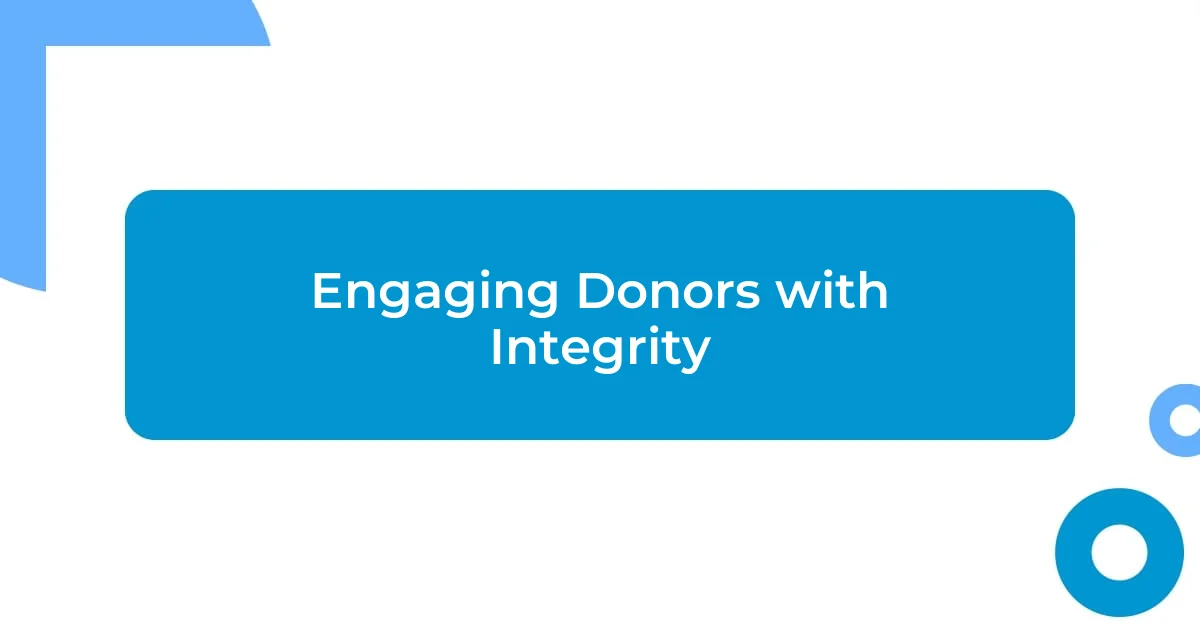
Engaging Donors with Integrity
Engaging donors with integrity means being genuine in every interaction. I remember a time when a charity reached out directly to me with a heartfelt message detailing a specific project. They weren’t just asking for money; they were inviting me to join their journey. It felt authentic, and I could see how my contribution would make a tangible difference. Have you ever received a message that made you feel like you were truly part of something meaningful? That’s what ethical engagement does—it transforms donors into advocates.
In my experience, personal relationships with donors are vital. A simple thank you can go a long way, but I’ve found that following up with personalized updates about how their contributions are making an impact fosters deeper connections. When I received a call from a nonprofit I supported, sharing stories of lives changed because of my donation, I felt valued as a partner rather than just a wallet. Isn’t it powerful when our efforts are recognized and celebrated?
To truly uphold integrity in donor engagement, I believe it’s essential to create a culture of open communication. I once participated in a fundraising initiative that actively sought donor feedback on future projects. It was refreshing to see that our opinions mattered and that the organization valued our insights. This inclusive approach not only strengthened our bond but also empowered us to feel invested in the cause. By creating such rapport, organizations can transform occasional donors into lifelong supporters.
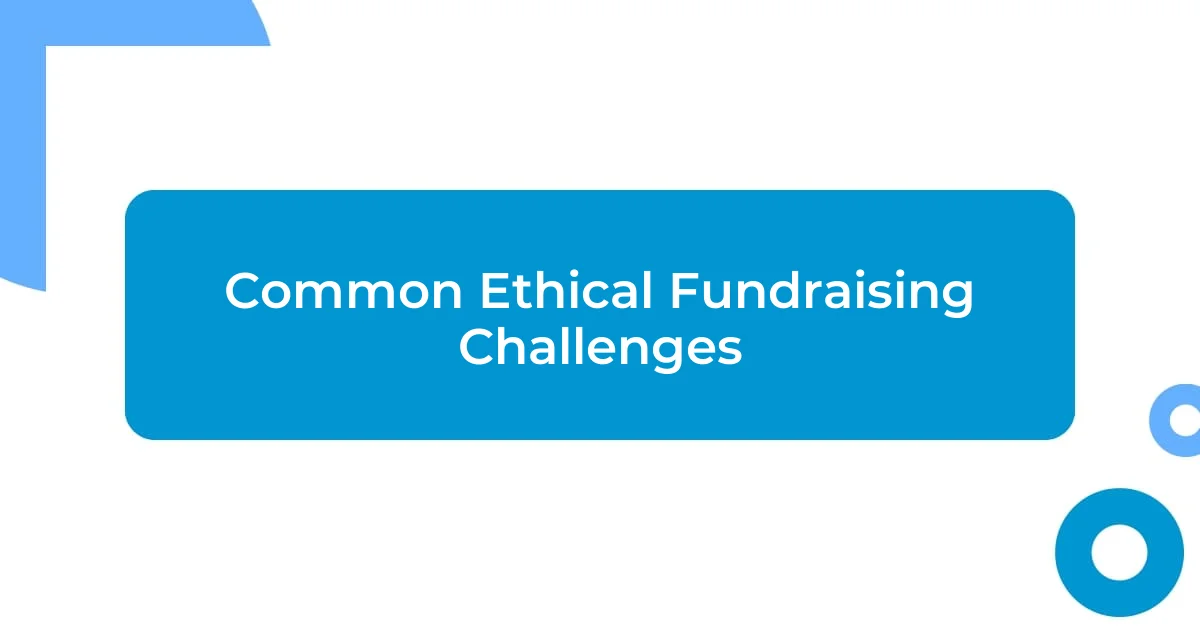
Common Ethical Fundraising Challenges
One common ethical fundraising challenge is balancing persuasive tactics with integrity. I’ve watched organizations employ high-pressure techniques that, while effective in the short term, often backfire in the long run. Aren’t we more likely to support causes when we’re motivated by passion rather than pressure? When donors feel manipulated, it can lead to distrust, damaging relationships that took time and effort to build.
Another challenge is the misconception of donor intentions. I’ve encountered situations where organizations assumed they knew what donors wanted, without asking them directly. For instance, I once worked with a group that launched a campaign based solely on their assumptions about community needs, only to find out later that local supporters had different priorities. How often do we fail to engage in this critical conversation? By prioritizing donor voices, organizations can create campaigns that genuinely resonate with their supporters, fostering long-lasting engagement.
Lastly, transparency around fund allocation is a persistent concern. I’ve seen donors grow uneasy when they feel uncertain about where their contributions go. For example, I once donated to a cause and later discovered that a significant portion of the funds went toward administrative costs rather than the cause I cared about. This experience made me question whether my support truly made a difference. Isn’t it crucial for donors to know exactly how their money is being put to use? Ensuring openness about funding distribution not only aligns with ethical practices but also strengthens trust and encourages continued support.
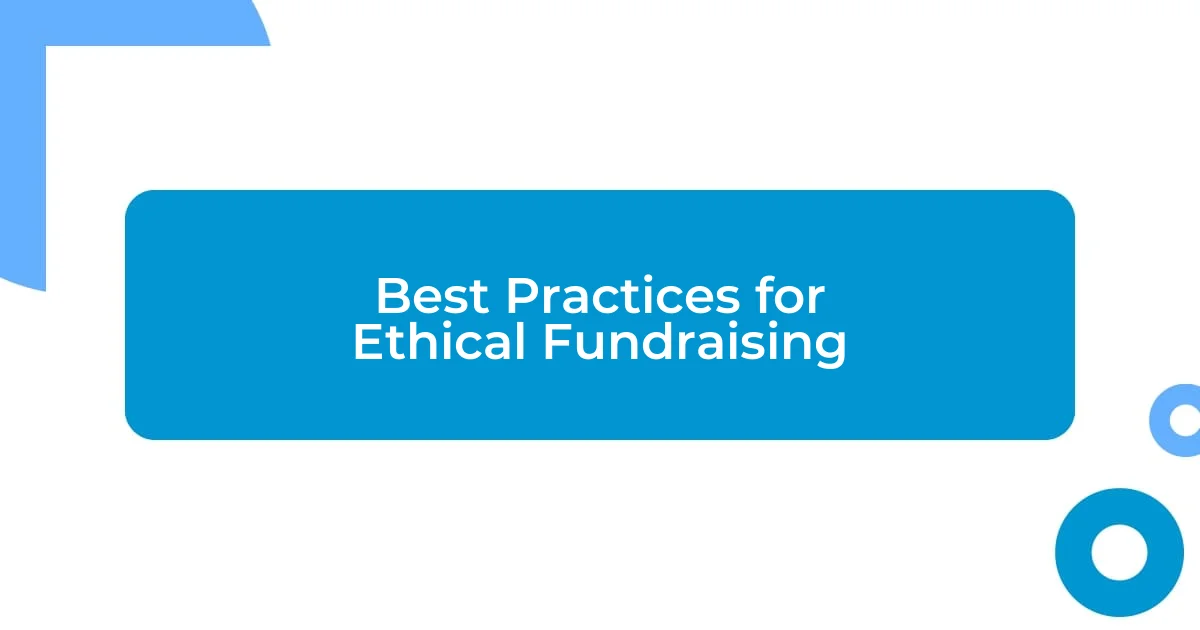
Best Practices for Ethical Fundraising
When it comes to ethical fundraising, one of the best practices is to prioritize authenticity in storytelling. I remember attending a charity event where a beneficiary shared their story firsthand. The raw emotion in their voice was palpable, and it reminded me of the power of real, lived experiences. Donors can often sense when a story is crafted just for appeal versus when it’s genuinely lived. Have you ever felt a deep connection to a story that just seemed too polished? That authenticity makes a difference.
Another key aspect is ensuring that fundraising appeals align with the values of the organization and its supporters. I once volunteered for a nonprofit that actively involved its community in decision-making. During one campaign, we reached out to supporters to gather their input on our fundraising efforts. The response was overwhelmingly positive, and it was enlightening to see how aligning our strategies with our donors’ values created a stronger, more unified mission. Don’t you think that when we feel our values are represented, we’re more likely to contribute?
Lastly, regular communication about how funds are utilized is essential for building trust. I vividly recall a nonprofit that sent out quarterly updates illustrating the direct impact of donors’ contributions through infographics and personal stories. It not only kept us informed but also made us feel like integral members of the mission, investing in something that mattered. Knowing the specific outcomes of our support can be incredibly motivating, right? By maintaining transparency, organizations can foster a culture of trust that encourages ongoing engagement.
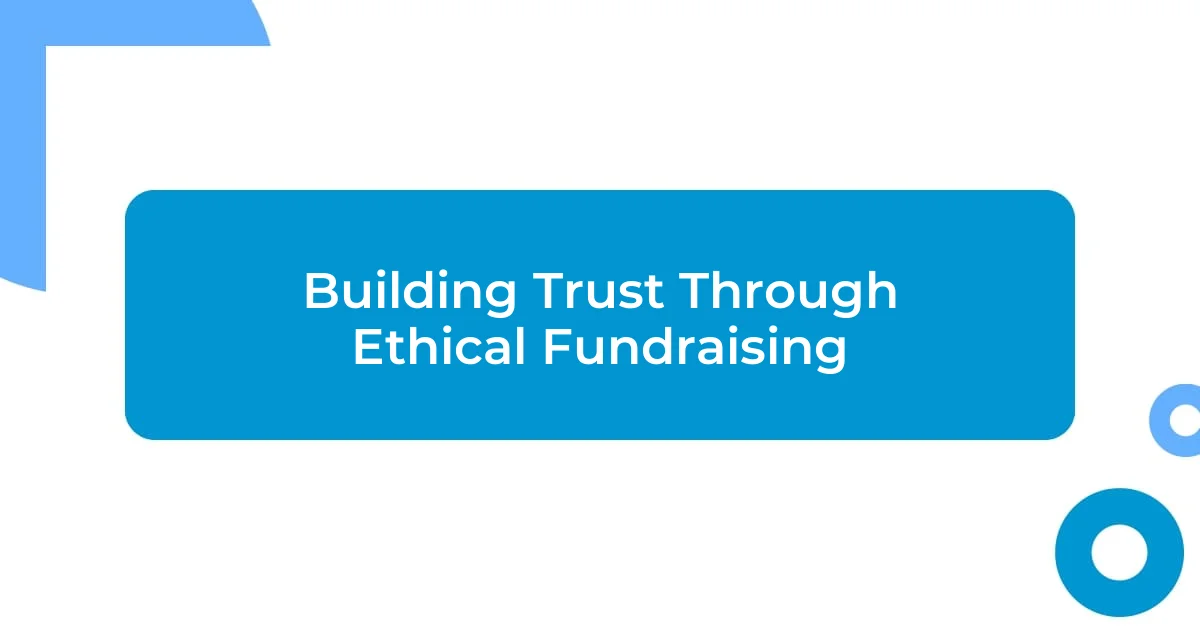
Building Trust Through Ethical Fundraising
Building trust through ethical fundraising is all about authenticity and transparency. I remember a time when I made a small donation to a local cause, and I was genuinely touched when they sent me a handwritten thank-you note. It wasn’t just a formality; it felt personal, as if my contribution really mattered. Isn’t that what we all crave—a connection to the causes we support? When organizations take the time to treat donors as individuals rather than just numbers, it builds a stronger foundation of trust.
Moreover, I’ve noticed that ethical fundraising flourishes when there’s clear communication about how donations are used. A few years ago, I volunteered for a project and later received a detailed report outlining exactly how our funds were spent. Seeing the impact of our contributions transformed my perspective; I felt proud to have been part of something meaningful. Have you ever experienced that uplifting moment when you realize your donation made a tangible difference? Clear updates and impact reports can reinforce trust and loyalty among supporters.
Finally, I often find that ethical fundraising thrives on the concept of mutual respect. A nonprofit I admire recently invited its donors to a community forum, allowing us to voice our thoughts and ask questions about their strategies. This open dialogue fostered a sense of shared purpose. Isn’t it refreshing when organizations prioritize conversations over transactions? When people feel their opinions are valued, they’re more likely to invest their time and resources into the mission. Trust isn’t just built; it’s nurtured through collaboration and respect.












